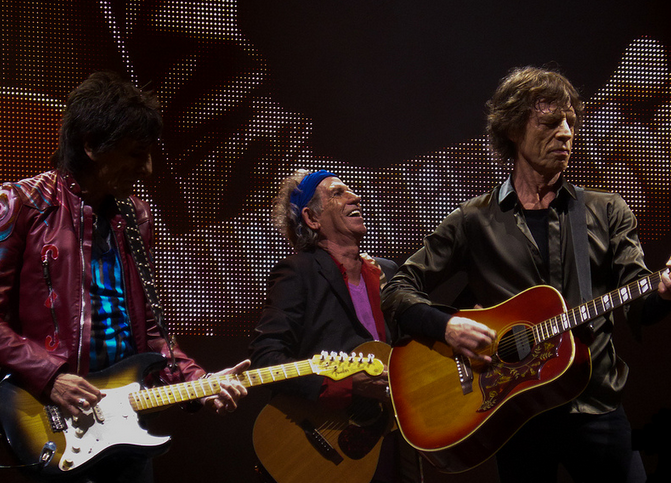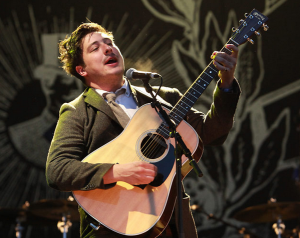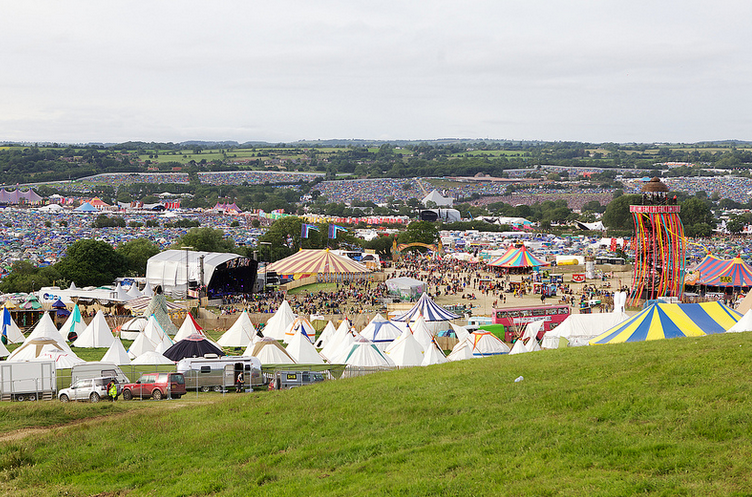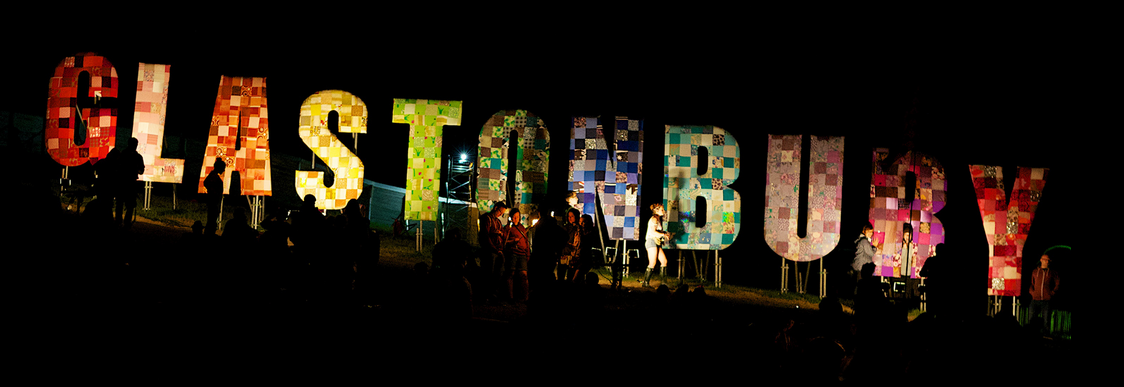Festival Review: Glastonbury
What a weekend. Glastonbury has traditionally thrown down the gauntlet to its muddy-field rivals with stellar headline acts, ranging from Beyoncé to Bruce Springsteen, U2 to Stevie Wonder, and it did not disappoint on its return after last year’s absence.
The 2013 model had a lot to promise with the hugely popular Arctic Monkeys, the infectiously upbeat folk titans Mumford & Sons, and – in a thrillingly ambitious coup for the festival – The Rolling Stones. Once again, all three headliners lived up to the not-insignificant expectations, and festival organiser Michael Eavis called it “the best festival yet”: could it ever be topped?
 The Rolling Stones were, of course, the act which had festival-goers salivating especially feverishly. Their Saturday night performance was the perfect rebuttal to those who feared that the aged rockstars would struggle to recapture the energy of old. Mick Jagger, at the sprightly age of 69, thrilled the 100,000-strong crowd with an opening rendition of ‘Jumpin’ Jack Flash’, before seamlessly rummaging through the archives to placate young and old attendees alike. One inherent danger of booking veteran stars is alienating the younger contingent of the Glastonbury audience, but the energy with which set closer ‘Satisfaction’ was belted out by seemingly everybody at Worthy Farm showed that the Stones’ iconic status is appreciated by all. Any fears of anticlimax were thunderously sidestepped; the performance, reportedly watched by 2.5 million people on BBC Two, was a testament to the band’s longevity and, quite simply, their love for what they do.
The Rolling Stones were, of course, the act which had festival-goers salivating especially feverishly. Their Saturday night performance was the perfect rebuttal to those who feared that the aged rockstars would struggle to recapture the energy of old. Mick Jagger, at the sprightly age of 69, thrilled the 100,000-strong crowd with an opening rendition of ‘Jumpin’ Jack Flash’, before seamlessly rummaging through the archives to placate young and old attendees alike. One inherent danger of booking veteran stars is alienating the younger contingent of the Glastonbury audience, but the energy with which set closer ‘Satisfaction’ was belted out by seemingly everybody at Worthy Farm showed that the Stones’ iconic status is appreciated by all. Any fears of anticlimax were thunderously sidestepped; the performance, reportedly watched by 2.5 million people on BBC Two, was a testament to the band’s longevity and, quite simply, their love for what they do.
The previous night, the Arctic Monkeys centralised their position as one of the most universally-loved British bands with a similarly spectacular performance on the Pyramid Stage. Alex Turner’s troops first headlined the festival in 2007, following the release of their record-breaking debut album, yet produced what many critics considered to be an oddly disjointed performance. Thankfully, the 2013 sequel was electric yet endearing. ‘Brianstorm’ and ‘Dancing Shoes’, plucked from earlier albums, gave the set a classic feel, and ‘I Bet You Look Good On The Dancefloor’ brought howls of recognition from a vociferous crowd baying for more. Turner performed a PR masterstroke by including the crowd in an off-the-cuff rendition of ‘Happy Birthday’ for his mother Penny, who was present in the crowd; a creative touch which shows that the Monkeys are now masters of the live performance. Their new album, AM, will be released in September, and this set proved to be an exciting indicator of what fireworks are to be expected.
 The task fell to Mumford & Sons to close the festival on the Sunday night: a formidable task for a band which have appeared at Glastonbury for several consecutive years, but without the star billing bestowed upon them this time. Their two studio albums, Sigh No More and Babel, have brought folk-pop music back into the British consciousness, and they effortlessly rolled out their hits during a 90-minute set. For once, though, it was not the crooning Marcus Mumford who received the most adoration, but the bassist Ted Dwane, who had surgery for a life-threatening blood clot on his brain earlier this year. Interludes between songs were largely filled with repeated chants of “Ted! Ted! Ted!”, which lent the set a poignant feel and strengthened the bond between band and audience.
The task fell to Mumford & Sons to close the festival on the Sunday night: a formidable task for a band which have appeared at Glastonbury for several consecutive years, but without the star billing bestowed upon them this time. Their two studio albums, Sigh No More and Babel, have brought folk-pop music back into the British consciousness, and they effortlessly rolled out their hits during a 90-minute set. For once, though, it was not the crooning Marcus Mumford who received the most adoration, but the bassist Ted Dwane, who had surgery for a life-threatening blood clot on his brain earlier this year. Interludes between songs were largely filled with repeated chants of “Ted! Ted! Ted!”, which lent the set a poignant feel and strengthened the bond between band and audience.
One distinguishing strength of Mumford & Sons’ live performance is found in how the group seamlessly toy with tempo, gliding from the raucous ‘Little Lion Man’ to the pensive ‘Timshel’ with the simple explanation of their desire for “a quiet song”. The Mumfords’ sound has been ubiquitously described as “foot-tapping”, to the point where it has become something of an epiphet, but their slower songs are equally revered by core fans. Their expression of gratitude to the crowds at the end of their performance felt totally genuine, their unity amidst recent turmoil unquestionable. While the other headliners quickened the heartbeat, Mumford & Sons tugged gently on the heartstrings.
Glastonbury Festival is a formidable beast, which dwarfs every other festival experience across the country. That is not to diminish its rivals, but simply to attest that Glastonbury deserves its star billing, scale and reputation that it has cultivated over the years.
One great appeal of Glastonbury is the magnificent variety and quality away from the headline acts, an attribute evident this year too. Jake Bugg was the first major act on the Pyramid Stage on the opening Friday, and coaxed the audience into a head-nodding stupor with his soulful blend of retro and rock riffs. At just 19, he is a youngster with a bright future. Friday’s best act, however, had to be Bastille, booked onto the John Peel Stage before their debut album Bad Blood exploded onto the scene. They attracted the biggest ever crowd to that particular stage in the history of Glastonbury, and they belted out the highlights of their UK chart-topper with a presence which suggested that they are far more than a studio-friendly, short-term fad. The challenge, of course, will be to continue to produce new material, and to refuse to be content with their success so far.
 Hackney four-piece Rudimental had the Silver Hayes “Sonic” stage hopping in unison on Saturday evening with their collection of chart-friendly hits, while Vampire Weekend and The Vaccines powerfully showcased their best material on the Saturday and Sunday evenings, respectively. The only acts I witnessed that disappointed were The Hives and, surprisingly, Ben Howard. The Swedish rock band, headed by the extrovert Howlin’ Pelle Almqvist, failed to excite a sleepy Friday morning crowd on the Other Stage, and their frontman’s notorious attempts to incite banter with the crowd slipped disconcertingly into affronted arrogance when he was met with indifference. Howard himself is eminently likeable, and was happy to simply strum away, but doesn’t seem to have moved on since he first burst onto the scene last summer. It would be harsh to accuse him of complacency, but throughout his set, I was hoping he would find an extra gear; to produce something that elevated his set beyond the routine. Unfortunately, he was found wanting.
Hackney four-piece Rudimental had the Silver Hayes “Sonic” stage hopping in unison on Saturday evening with their collection of chart-friendly hits, while Vampire Weekend and The Vaccines powerfully showcased their best material on the Saturday and Sunday evenings, respectively. The only acts I witnessed that disappointed were The Hives and, surprisingly, Ben Howard. The Swedish rock band, headed by the extrovert Howlin’ Pelle Almqvist, failed to excite a sleepy Friday morning crowd on the Other Stage, and their frontman’s notorious attempts to incite banter with the crowd slipped disconcertingly into affronted arrogance when he was met with indifference. Howard himself is eminently likeable, and was happy to simply strum away, but doesn’t seem to have moved on since he first burst onto the scene last summer. It would be harsh to accuse him of complacency, but throughout his set, I was hoping he would find an extra gear; to produce something that elevated his set beyond the routine. Unfortunately, he was found wanting.
As a spectacle, Glastonbury offers everything one could want from a festival, and more. Each attendant’s perspective can do little more than scratch the surface; there is something to suit every taste, from the thudding beats of the Sonic stage to the relaxed reggae feel of the Gully tent, from the leisurely Acoustic stage to the late-night antics at Shangri-La. One thing to note is that it is impossible to conquer Glastonbury: it will always leave you wishing you had seen something more, that you were able to stay for an extra few days. It is a formidable beast that, in my eyes, dwarfs every other festival experience across the country. That is not to diminish its rivals, but simply to attest that Glastonbury deserves its star billing, scale and reputation that it has cultivated over the years.
“The best festival yet”, then, according to Eavis: a man who should know. This being my first time at Glastonbury, I could not possibly qualify that statement, but it certainly blew my mind. In a tantalising twist, Eavis let slip that he has already booked the acts for next year, including rumours of a veteran rock band to parallel The Rolling Stones. Expect a record-breaking rush for tickets upon their release in October, as veterans and novices jump upon this most unstoppable of bandwagons. For those who parted with £205 for this year’s event, every penny was spent wisely.
https://www.youtube.com/watch?v=iEtWPPa8wxI

Comments